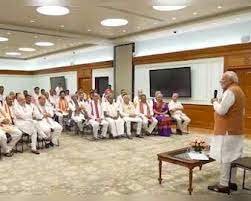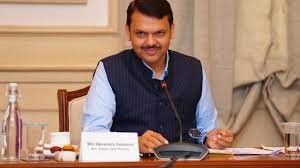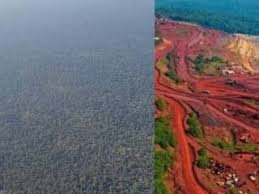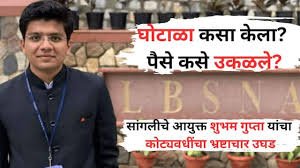
PM Modi: 'Don't make unnecessary statements' PM Modi's big advice to ministers in cabinet meeting
Mumbai: The Union Cabinet met on Wednesday under the chairmanship of Prime Minister Narendra Modi. During this time, the Prime Minister, along with reviewing the work, also gave several instructions to the ministers. He told the ministers that they should avoid talking on issues not related to their respective ministries. At the same time, they should not make unnecessary statements. The Prime Minister said that all the ministers should convey the achievements of the government in the last eleven years to the public. They should inform the public about the work and achievements of their respective ministries. Also, they should hold press conferences and inform about the work of the ministry.
Railway routes worth Rs 6,405 crore approved
Earlier, the Union Cabinet approved two railway projects passing through seven districts of Jharkhand, Karnataka and Andhra Pradesh, with a total cost of Rs 6,405 crore. Both these railway projects were approved in the meeting of the Cabinet Committee on Economic Affairs (CCEA).
One of the approved projects is related to the doubling of the 133-km-long Koderma-Barkakana line. This line not only passes through a major coal producing region in Jharkhand, but is also the shortest and most efficient rail link between Patna and Ranchi.
The other project is the doubling of the 185-km-long Bellary-Chikkajajur line. This line passes through Bellary and Chitradurga districts of Karnataka and Anantapur district of Andhra Pradesh.
According to an official statement, the approved multi-tracking project will increase rail connectivity to about 1,408 villages. The total population of these villages is about 28.19 lakh. The government said in the statement, "These railway lines are essential for the transportation of goods like coal, iron ore, finished steel, cement, fertilizers, agricultural and petroleum products. The increase in their capacity will result in an additional freight movement of 49 million tonnes per annum."
Mumbai: The Union Cabinet met on Wednesday under the chairmanship of Prime Minister Narendra Modi. During this time, the Prime Minister, along with reviewing the work, also gave several instructions to the ministers. He told the ministers that they should avoid talking on issues not related to their respective ministries. At the same time, they should not make unnecessary statements. The Prime Minister said that all the ministers should convey the achievements of the government in the last eleven years to the public. They should inform the public about the work and achievements of their respective ministries. Also, they should hold press conferences and inform about the work of the ministry.
Railway routes worth Rs 6,405 crore approved
Earlier, the Union Cabinet approved two railway projects passing through seven districts of Jharkhand, Karnataka and Andhra Pradesh, with a total cost of Rs 6,405 crore. Both these railway projects were approved in the meeting of the Cabinet Committee on Economic Affairs (CCEA).
One of the approved projects is related to the doubling of the 133-km-long Koderma-Barkakana line. This line not only passes through a major coal producing region in Jharkhand, but is also the shortest and most efficient rail link between Patna and Ranchi.
The other project is the doubling of the 185-km-long Bellary-Chikkajajur line. This line passes through Bellary and Chitradurga districts of Karnataka and Anantapur district of Andhra Pradesh.
According to an official statement, the approved multi-tracking project will increase rail connectivity to about 1,408 villages. The total population of these villages is about 28.19 lakh. The government said in the statement, "These railway lines are essential for the transportation of goods like coal, iron ore, finished steel, cement, fertilizers, agricultural and petroleum products. The increase in their capacity will result in an additional freight movement of 49 million tonnes per annum."
Railway routes worth Rs 6,405 crore approved
Earlier, the Union Cabinet approved two railway projects passing through seven districts of Jharkhand, Karnataka and Andhra Pradesh, with a total cost of Rs 6,405 crore. Both these railway projects were approved in the meeting of the Cabinet Committee on Economic Affairs (CCEA).
One of the approved projects is related to the doubling of the 133-km-long Koderma-Barkakana line. This line not only passes through a major coal producing region in Jharkhand, but is also the shortest and most efficient rail link between Patna and Ranchi.
The other project is the doubling of the 185-km-long Bellary-Chikkajajur line. This line passes through Bellary and Chitradurga districts of Karnataka and Anantapur district of Andhra Pradesh.
According to an official statement, the approved multi-tracking project will increase rail connectivity to about 1,408 villages. The total population of these villages is about 28.19 lakh. The government said in the statement, "These railway lines are essential for the transportation of goods like coal, iron ore, finished steel, cement, fertilizers, agricultural and petroleum products. The increase in their capacity will result in an additional freight movement of 49 million tonnes per annum."

.jpg)
















